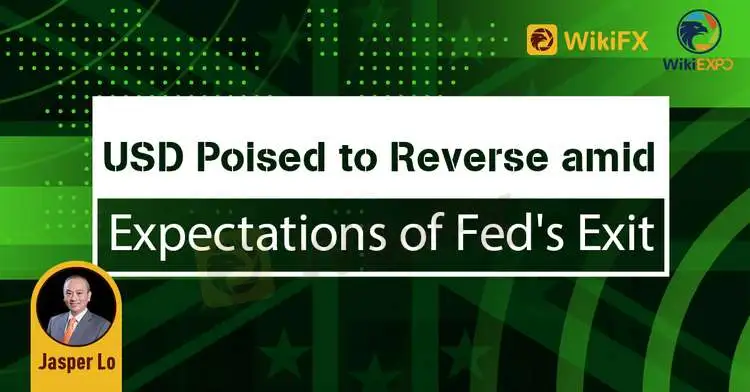简体中文
繁體中文
English
Pусский
日本語
ภาษาไทย
Tiếng Việt
Bahasa Indonesia
Español
हिन्दी
Filippiiniläinen
Français
Deutsch
Português
Türkçe
한국어
العربية
USD Poised to Reverse amid Expectations of Fed's Exit| Influencer‘s Insight •Jasper Lo
Abstract:A stream of good news hit the US financial market, with the $1.9 trillion stimulus package on track to be voted on and passed by Congress next Friday, and with the soaring stocks bringing about an air of optimism. The US economy has recovered vigorously according to its latest economic indicators. If the positive dynamic continues, chances are the market will speculate on the Fed's tightening monetary policy.

A stream of good news hit the US financial market, with the $1.9 trillion stimulus package on track to be voted on and passed by Congress next Friday, and with the soaring stocks bringing about an air of optimism. The US economy has recovered vigorously according to its latest economic indicators. If the positive dynamic continues, chances are the market will speculate on the Fed's tightening monetary policy.
The market has been inspired by the latest US core PPI, PPI, core retail sales, and retail sales, which were all significantly better than expected and previous values. These prints not only reflected a reviving economy, but also fueled inflation. The Fed officials in the minutes of its January 27 meeting reiterated it would be some time before conditions to scale back their massive bond purchases were met. Nevertheless, both the stock market and the economic performance have embraced further growth. Although Powell's downbeat economic outlook after the last meeting surprised at the time, the fact is the US economy is regaining energy an an amazing pace.

While the US 10-Year Treasury yield continues climbing, stocks have been refreshing new record highs, and economic and inflation readings have risen sharply. Besides, the interest rate futures of the Chicago Mercantile Exchange show that the chance for a rate hike during September to December has picked up to 11.8%. All these signals indicate that the financial market is betting on the Fed's tightening monetary policy. The market will speculate on a rate hike in the case of no quantitative easing. But since the Fed is adding money supply, the market now firstly expects the Fed's exit. I believe the Fed will be the first central bank that gets off the market, which will put a large premium on the US dollar. Moreover, the soaring US 10-Year Treasury yield and the potential hike in interest rate futures will also bode well for the dollar.

With that said, Biden's $15-per-hour minimum wage proposed in the $1.9 trillion package propel the spiking inflation higher. Some analysts predicted that the Fed would maintain the weak dollar instead of rushing into a rate hike before the inflation went 2.5%. But this target is possible to be overshoot in the second half of the year based on the current progress. Repeatedly, I expect the Fed to raise the rate with a chance of 0%, and the financial market will speculate on the Fed's exit rather than a rate hike. Traders must keep in mind that a market exit will lead to a dollar surge or even reversal. In general, I believe the strong rebound in US economic data is not just a passing fad, but building up a head of steam.
Disclaimer:
The views in this article only represent the author's personal views, and do not constitute investment advice on this platform. This platform does not guarantee the accuracy, completeness and timeliness of the information in the article, and will not be liable for any loss caused by the use of or reliance on the information in the article.
Read more

Key Forex Strategies
New to forex trading and looking for simple and effective trading strategies? We got you covered! In this quick guide, we'll explain some of the key forex strategies which are easy to digest. So, let's start!

Fundamental vs Technical Analysis
Fundamental and technical analysis play some of the most influential and critical roles in making trading decisions amongst traders today. They are widely accepted by stock, foreign exchange, indices and cryptocurrency traders worldwide. Traders use either or both of the methods to make key trading decisions in their respective markets.

Going Short of JPY Is Boosted by Yellen’s Remark on Interest-Rate Hikes Again
When interviewed by Bloomberg, Yellen, the U.S. Treasury Secretary, indicated that the USD 4-trillion budget released by Biden would be beneficial to America even if it may increase inflation and interest rates.

Brent oil is predicted of bullish repricing by Goldman Sach
According to Goldman Sachs' head of energy research, a nuclear deal between the U.S. and Iran could send energy prices higher - even if it means more supply in the oil markets. Talks are ongoing in Vienna between Iran and the six world powers - the U.S., China, Russia, France, U.K., and Germany - trying to salvage the 2015 landmark deal. Officials say there's been progress, but the conclusion of the negotiations remains unclear and oil prices have been soaring as a result.
WikiFX Broker
Latest News
CWG Markets Got FSCA, South Africa Authorisation
Amazon launches Temu and Shein rival with \crazy low\ prices
CySEC Warns Against Unauthorized Investment Firms in Cyprus
JUST Finance and UBX Launch Multi-Currency Stablecoin Exchange
XM Revamps Website with Sleek Design and App Focus
TradingView & Mexico’s Uni. Partnership, to Enhance Financial Education
Something You Need to Know About SogoTrade
Global Shift in Cryptocurrency Taxation: Italy and Denmark Chart New Paths
Webull Introduces 24/5 Overnight Trading to Extend U.S. Market Access
eToro Launches Global-Edge Smart Portfolio: A Balanced Approach to Growth and Stability
Currency Calculator



